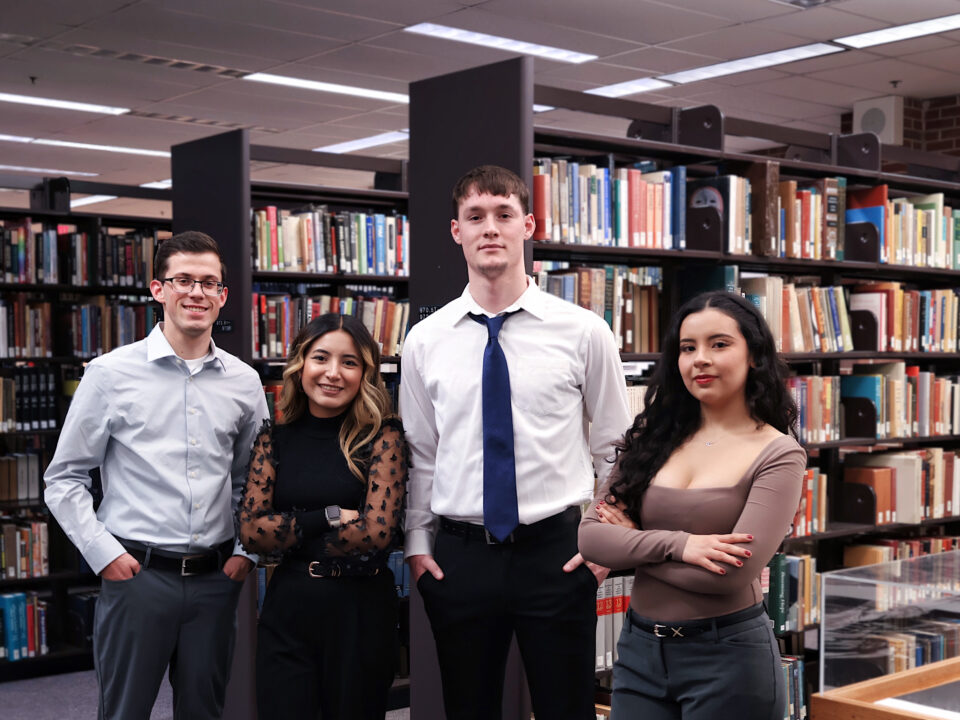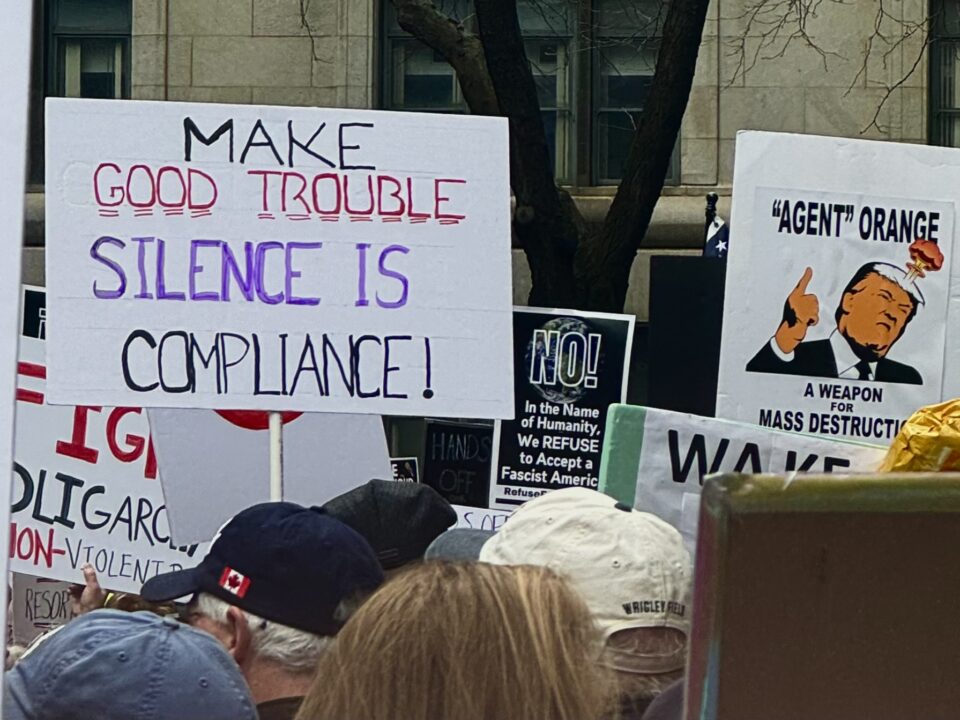Campus community meets with final four VP of DEI candidates
Members of the campus community were invited to meet with the four final candidates in the search for the inaugural vice president of diversity, equity, and inclusion role through in-person and virtual sessions throughout the week of Sept. 26 to Sept. 30.
Each candidate comes from different backgrounds surrounding their own experience with DEI work, how they implement strategies at their current and previous institutions, and what they would bring to Elmhurst University.
A common theme amongst the four candidates was the importance of having a center for DEI on campus for students and how they would push for the creation of one. Additionally, a question passed around in each session was what their first year would look like, and two of the four candidates said they would spend that time creating relationships with faculty and students.
For the reporting of this story, The Leader was requested to keep the identities of the four candidates anonymous, since they are still employed at other institutions who may not be aware of their job search at EU.
Candidate A:
Candidate A has worked 15 years in higher education, with ten of those years in DEI. Currently, the candidate is a director for equity and inclusion at a top ten liberal arts college and has worked there for three years.
In their session, they explored their background working toward promoting LGBTQIA+ initiatives and spaces at former and current institutions, mentioning how they ran a center for queer and trans students at their previous institution, highlighting the benefit of centers geared toward supporting students’ identities.
“When you design separate centers in that way they’re often intentionally focused on meeting one aspect of a student’s identity but students have multiple identities,” said Candidate A. “When we’re thinking about designing a center on a campus this size, it needs to be intentionally focused on having students feel welcomed and affirmed across all of their identities.”
This candidate’s goal is to work closely and create relationships with members of the campus community to dissect the needs of what DEI work EU needs from them. They don’t expect people to understand from the jump how to tackle an issue to strengthen DEI on campus, but it’s important people are aware of what needs to be done.
“Fundamentally the biggest challenge I’ve faced in higher education isn’t the what,” said Candidate A. “We all get what we’re supposed to be doing, people just don’t know how to do it.”
Candidate B:
Candidate B began working in higher education in 2018 as an equity specialist at a top ten university. Previously, they worked as a social worker and lawyer, before stepping into higher education and DEI.
“I feel DEI is a great way to encapsulate all the work I’ve done so far,” said Candidate B.
They mention one way to enact change at institutions is to look at systems to see whether or not they bring down barriers or upkeep them.
Additionally, the candidate spoke about how by looking at the systems in place the institution can evaluate what needs to be fixed to best serve the campus community.
“I think it’s important to be really intentional about where change needs to occur,” said Candidate B. “I think it’s important to look at what has been done but also feel free to design something new [training programs for faculty and students] and I always look to partner with folks in that work.”
Collaborating with student groups would be a priority for this candidate who said the person in this role should not dictate what different groups on campus need without seeking out the specifics of what they need first.
“For those students it would be really important to hear the ways in which the programming needs to meet their specific needs,” said Candidate B.
Some of the resources this candidate would want being in the role is implementing a system of accountability, having a vision tailored to individuals on campus, and buy in from the community of people willing to work with them.
Candidate C:
Candidate C has 30 years of DEI experience. They were hired as a director of minority student services at a time when the rural university they were at was receiving many new students from New York City who struggled with the transition.
“When I got there I said ‘my definition of diversity isn’t minority student services, it’s in [a] much broader umbrella,’” said Candidate C at the open interview session.
After five years at their first DEI job, Candidate C was then recruited to a different university as a director of multicultural affairs after a cross burning took place on their campus.
Candidate C did not always want to work in higher education, but wanted to be an NYC police officer. However, their career path changed as an undergraduate after receiving over 300 prank phone calls due to their race and sexual orientation.
Due to Candidate C having not come out to their family at the time, they had nobody else to go to except the DEI office at their university. The experience helped them fall in love with the work DEI offices do.
“So that was just this moment of time where I had to navigate that without the support of family,” said Candidate C at the open interview session. “It was the student affairs people, the DEI professionals that wrapped their arms around me during that difficult season of my life.”
Candidate C is hoping to bring their 30 years of professional experience to a university that, they believe, has many opportunities to increase diversity. These opportunities include a new strategic plan for diversity, the recognition of diversity as a pillar of the institution, an affiliation with a progressive church denomination, and proximity to a diverse major city.
“In some way I see a lot of the pieces on the table, and it looks like what you need is an experienced DEI leader to help pull the pieces together in an organized plan and move it forward,” said Candidate C.
Candidate C is hoping to implement a welcoming diversity workshop at EU, which is a product of the National Coalition Building Institute. Candidate C has been using this program for over 20 years.
The program starts with the examination of community, asking people what groups they identify with, and how those groups are perceived. Then there is the self-examination of other groups and how individuals feel about other groups. Eventually, the candidate will help students identify traumas based on their identity, and process those traumas.
Lastly, the candidate will lay out methods of dealing with offensive and discriminatory language that may come up.
Candidate D:
Candidate D has amassed 36 years of experience in higher education and DEI, first serving as an adviser to multicultural affairs to currently being in an inaugural racial equity position at a metropolitan college this year.
Candidate D wants to come to EU in order to see the change happening, and have more access to the wider institution as a whole.
“There’s something about a private, liberal arts college where it’s small enough that you can put your whole arms around it, and see the change you want to be,” said Candidate D at the open interview session.
Candidate D believes universities must be centered in the world, and not an escape from the world.
“I look forward to working, if that were to happen, with you and others to make sure that this place is preparing you, it is welcoming you, it is including you, and it is giving you a sense of purpose doing your four years,” said Candidate D.
Candidate D believes building relationships and discovering the needs of students are two actions that they should do if they are hired
“My goal would be to make sure that students are supported,” said Candidate D.
Candidate D also believes it is vital for students to have an advocate, and that their position would involve working with students closely to understand them.
“We do need a place, both where you feel like you have a check-in point, [and] someplace that you know you can go to and you don’t have to explain yourself,” said Candidate D.


